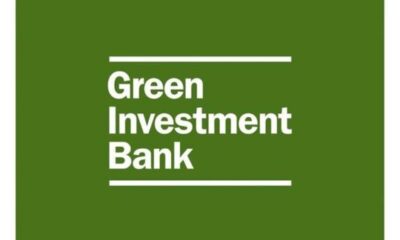Features
What are you investing in and who are you investing for?
Simon Leadbetter takes a look at what motivates tens of thousands of people to invest sustainably.
 Simon Leadbetter takes a look at what motivates tens of thousands of people to invest sustainably.
Simon Leadbetter takes a look at what motivates tens of thousands of people to invest sustainably.
In October 2011, nearly 38% of people said they were interested in investing ethically (EIRIS, 2011). Before that in December 2010, The Financial Times noted that, “record numbers of individuals are investing with a conscience”. Back in September 2010, EUROSIF predicted that by 2013 the share of high net worth individuals’ portfolios in ethical investments would have increased to 15%, just below the €1.2 trillion mark. Maybe it’s time to take a closer look at sustainable investment.
But what is sustainable investing?
One of the biggest issues facing this growing industry is misunderstanding of what it is.
So what is sustainable investment? Often called ethical investment, socially responsible or green investment, sustainable investments look at the need to balance the economic, social and environmental effects of the companies they invest in. Sustainable investors look to invest in those companies that ensure the continuing viability of our environment and society, while still delivering for them the income they need; those with a good record on what is also known as the triple bottom line (economic, social and environmental), the three Ps (profit, people and planet) or ESG (environmental, social and governance).
Born in the 18th Century, sustainable investing “began mostly with religious groups in the UK and the United States who were concerned with investing and making money based on moral principles supported by their religious and moral beliefs. ‘Morally deviant’ investment practices at the time were exemplified by profitable endeavours such as the slave trade that ethical investors sought to avoid” (B> 2010).
Sustainable investors stand along a spectrum from dark green to light green. The darker green you are, the more likely you are to only invest in those companies that behave sustainably. The lighter green you are, the more likely you are to simply avoid those companies that behave the least sustainably. These positions respectively deploy positive screening (dark greens seek out sustainable companies) and negative screening (light greens screen out unsustainable companies).
So where are you on that spectrum? If you only want to invest in those companies that are sustainable, you are limiting your choice of companies to a select but excellent few. As a result you may experience a rougher investment ride, as you cannot spread the risk more widely. That said you will also sleep with a clean conscience and would probably be backing the global business leaders of the future and making the planet a better place for everyone. You may be backing the future Google or Apple of sustainability. If you would prefer to simply avoid companies who are involved in activities you disagree with you are a lighter shade of green. This carries less risk but does mean the occasional unsavoury company may squeak through the screening process.
There are clear trade-offs. What might be ethical, such as global trade that benefits the developing world, might not be environmentally friendly and vice versa. If we fly there to visit them, or fly or ship their produce back to us we create wealth for them, but cause pollution.
Critically your environmental and ethical perspectives are unique to you, as are your financial needs and expectations; what is acceptable or unacceptable to someone else may not be to you.
The three wise monkeys of investing
If the first challenge of sustainable investing is misunderstanding, then the second challenge is the three wise monkeys of investing: The see no evil, hear no evil and speak no evil approach. Most private investors we speak to, while thoroughly ethical people in the daily lives, would just prefer not to hear anything about where their investments are heading, be that building bombs, funding pornography, supporting cosmetic testing on animals or building businesses that use child labour in far off lands. Apathy and ignorance aren’t crimes but their effects can be criminal.
It’s fair to say that the financial services industry does its best to make financial products as incomprehensible and mind-numbingly dull as possible, so investors shouldn’t feel they need to take all the responsibility.
Imagine I gave you £1,000
If you put £1,000 into a straightforward FTSE100 tracker fund, £108 will go into the shares of tobacco companies; a further £196 will go into Oil & Gas companies; £145 will back basic materials (mining and refining of metals, chemical producers and forestry products); of the remaining £551, the big utility companies, who keep sending those blood-chilling quarterly bills, get £41 from you (FTSE, June 1011).
Undoubtedly, smoking, digging, drilling and burning fossil fuels are very profitable industries. Our old economy and pension funds depended on them.
On the other hand one in 10 adults in the world die from smoking related diseases each year (WHO, 2010). As public health campaigns and smoking bans in the developed world force down the numbers of smokers here, companies seek out new markets in the developing world, particularly in Asia and Africa (Tobacco Atlas, 2010). Whatever your perspective there’s something unpleasant about a highly profitable developed world company exploiting a lack of understanding to peddle cancer for more profit.
Burning fossil fuels (in power plants, planes, trains and automobiles) creates air pollution which causes headaches, fatigue, respiratory illnesses, cardio-vascular problems, gastroenteritis, cancer, nausea and skin irritation, ignoring for one moment its generous contribution to climate change. According to a 2010 Parliamentary Environmental Audit Committee report air pollution causes 50,000 early deaths in the UK. It also costs the UK over £3.5bn according to the European Environment Agency or the equivalent of 195,000 nurses (the NHS employs 300,000 nurses in England).
This is all very well I hear you say but “I need a return on investment“. To which the sustainable investor replies, “At what cost?“.
Is it worth it if that return on investment means we have to fight wars for oil in the Middle East? (£12.50 of your hypothetical £1,000 goes to BAE systems – a manufacturer of weapons known euphemistically as defence systems) Is it worth it if we use high pressured water systems to fracture our land (fracking) to release shale gas, causing earth tremors and increasing our carbon emissions? Is it worth it if that return on investment means your children are more likely to suffer from respiratory disease? Is it worth it if they’re exposed to pornography from a young age? Do we care? Should we?
This does not mean being a puritan or going back to the Stone Age economically. If you smoke or drink that’s up to you but remember every pound you spend with these companies and every pound you may inadvertently invest in them is being used very deliberately to recruit the next generation of smokers and drinkers. The businesses involved have made the brutal calculation that you’ll be dead soon enough and you need to be replaced to keep shareholders happy.
More importantly, every pound invested in fossil fuels is a pound not spent on renewable energy. As we reported in November a 2010 independent report on offshore wind potential, Offshore Valuation, described the North Sea’s potential to be the ‘Saudi Arabia of renewable energy’. For the United Kingdom to sit on the shoreline of this massive and unending source of clean, natural energy and do little about it is economic, strategic and energy security madness. With investment in renewable energy overtaking fossil fuels and another North Sea nation declaring itself ready to go 100% renewable, now might be a time to look at your portfolio and see whom you are investing in.
 There are some that argue that renewable energy is too expensive and the power too intermittent. But prices have been falling for the last twenty years and will continue to fall (Seeking Alpha 2010).
There are some that argue that renewable energy is too expensive and the power too intermittent. But prices have been falling for the last twenty years and will continue to fall (Seeking Alpha 2010).
The author of a recent Bloomberg New Energy Finance report, Justin Wu, said, “The public perception of wind power tends to be that it is environmentally-friendly, but expensive and intermittent. That is out-of-date in the best locations, where generation is already cost-competitive with fossil fuel electricity, and that will be the case for the majority of new onshore turbines installed worldwide by 2016.
“The press is reacting to the recent price drops in solar equipment as though they are the result of temporary oversupply or of a trade war. This masks what is really going on: a long-term, consistent drop in clean energy technology costs, resulting from decades of hard work by tens of thousands of researchers, engineers, technicians and people in operations and procurement. And it is not going to stop: In the next few years the mainstream world is going to wake up to wind cheaper than gas and rooftop solar power cheaper than daytime electricity.”
The third and final challenge is getting good quality independent advice
Many readers tell us that they’ve floated the idea of investing sustainably, responsibly or ethically only for their financial adviser or wealth manager to roll his or her eyes, purse their lips and make a sharp remark something akin to, “well, if you want give up financial security and return on investment, then that’s up to you”.
This is a remarkably ill-informed perspective. Firstly, the adviser should be independent and it is not their role to ignore any moral or ethical concerns you may have. As we’ve said above, dark green funds that only invest in sustainable companies can be more volatile, but there are 90 funds to choose from. The majority of these use negative screening so as to balance stability and profitability with sustainability.
Secondly, the performance of some sustainable funds has been remarkable over the last few years. In February 2011, Mark Smith of Trustnet reported that, “Four out of the five ethical bond funds in the IMA Sterling Bond sector outperformed the sector average over the last year, with Rathbone Ethical Bond returning more to investors than any other corporate bond fund over a six-month period”.
In summary, it’s about being true to your values and securing the value of your investments
Just as no-one expects you be a saint in your lifestyle choices, nor does anyone but the darkest green expect you to be a saint in your investment choices. Simply exploring the options is the first step. Reading Blue & Green Tomorrow will give you different perspectives from various ethical financial advisers and fund managers. Yourethicalmoney.org provides a wealth of information and if you type ‘ethical investment’ into Google or Bing you’ll be surprised at the wealth of resources available.
You are more powerful than ever as a voter, consumer and shareholder and you can make a difference.
If you decide to take another step, talk to your financial adviser is you have one. If they sniff at the very idea of sustainable investment ask yourself whose interests they really have at heart. If they cannot be bothered to research the funds that meet your financial and moral needs why should they deserve your trust and money in the form of fees or commission? Alternatively, we have a panel of ethical financial advisers who can help you make the right decisions for your wallet and your conscience. Simply complete our online form and we’ll put you in contact with someone who can guide you.































